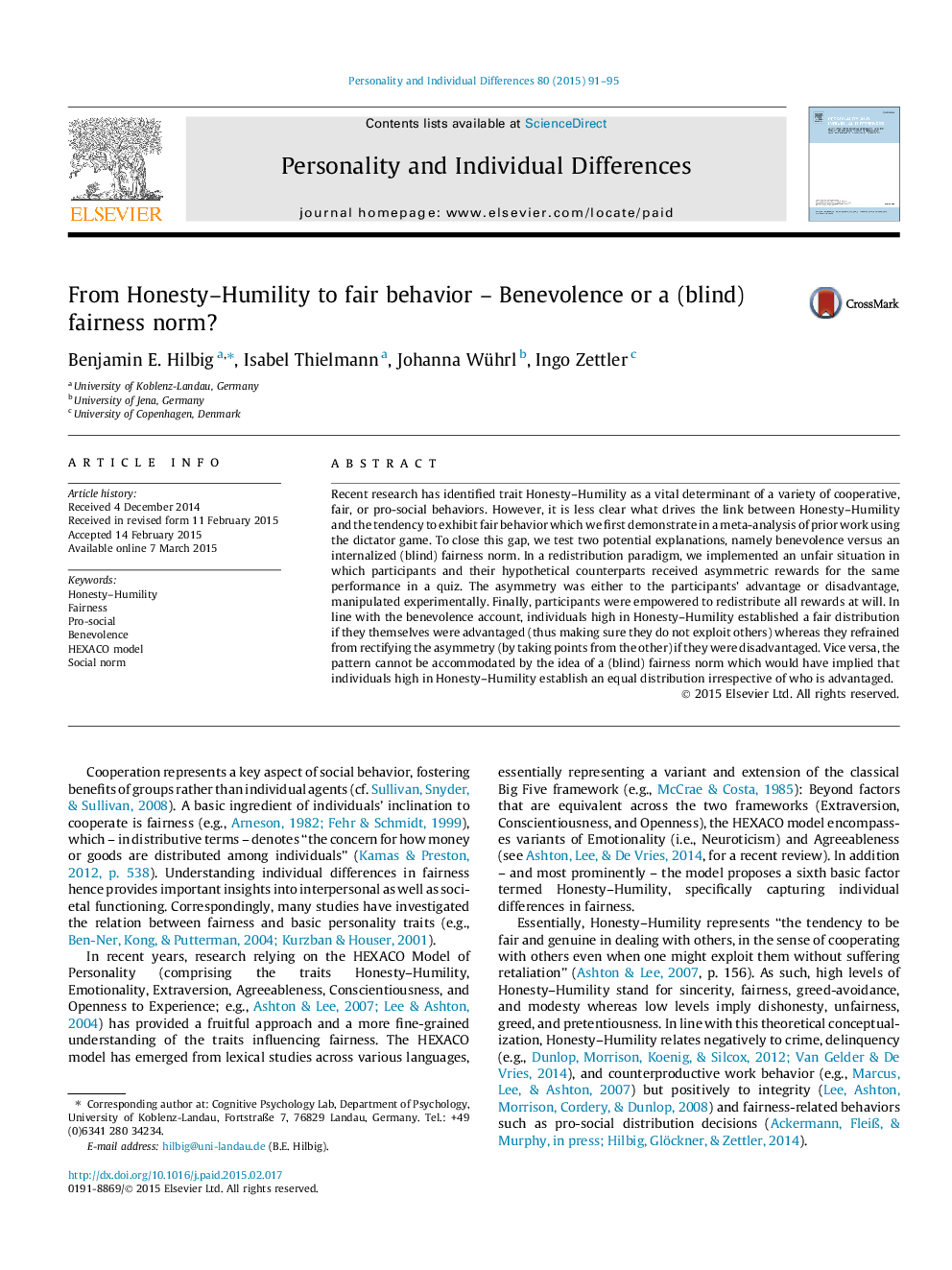| کد مقاله | کد نشریه | سال انتشار | مقاله انگلیسی | نسخه تمام متن |
|---|---|---|---|---|
| 7251533 | 1472038 | 2015 | 5 صفحه PDF | دانلود رایگان |
عنوان انگلیسی مقاله ISI
From Honesty-Humility to fair behavior - Benevolence or a (blind) fairness norm?
ترجمه فارسی عنوان
از صداقت - محبت به رفتار منصفانه - خیرخواهی یا عدالت (کور) عدالت؟
دانلود مقاله + سفارش ترجمه
دانلود مقاله ISI انگلیسی
رایگان برای ایرانیان
کلمات کلیدی
ترجمه چکیده
تحقیقات اخیر ویژگی صلح جوینی بودن را به عنوان یک عامل حیاتی برای انواع رفتارهای تعاونی، عادلانه و یا طرفدار اجتماعی شناسایی کرده است. با این حال، روشن نیست که ارتباط بین صمیمیت و تساهل و تمایل به نمایش رفتار منصفانه که در ابتدا در تجزیه و تحلیل متاآنالیز کار پیشین با استفاده از بازی دیکتاتور نشان داده می شود، در حال حرکت است. برای بستن این شکاف، ما دو توضیح بالقوه را آزمایش می کنیم، یعنی خیرخواهی در برابر یک عدالت داخلی (کور) عدالت. در یک پارادایم توزیع مجدد، ما یک وضعیت ناعادلانه را به کار برده ایم که در آن شرکت کنندگان و همتایان فرعی آنها پاداش های نامتقارن برای عملکرد مشابه در مسابقه دریافت کردند. نامتقارن یا به نفع یا ضعف شرکت کنندگان بود، که به صورت آزمایشی دستکاری شده بود. در نهایت شرکت کنندگان توانستند تمامی پاداش ها را در اختیار توزیع کنند. در راستای حساب خیرخواهی، افرادی که درجستجوی صداقت بودند، یک توزیع منصفانه را در صورتی که خودشان از آن بهره مند شدند (به این ترتیب اطمینان حاصل کنند که از دیگران بهره برداری ننمایند)، از اصلاح نامتقارن (با گرفتن امتیاز از سوی دیگر)، اگر آنها محروم برعکس، این الگو نمی تواند توسط ایده یک عدالت انعکاسی (کور) مطابقت داشته باشد که می تواند به این معنا باشد که افرادی که در صداقت عفتی بالا هستند، یک توزیع برابر را ایجاد می کنند بدون آن که کسی از آن بهره مند شود.
موضوعات مرتبط
علوم زیستی و بیوفناوری
علم عصب شناسی
علوم اعصاب رفتاری
چکیده انگلیسی
Recent research has identified trait Honesty-Humility as a vital determinant of a variety of cooperative, fair, or pro-social behaviors. However, it is less clear what drives the link between Honesty-Humility and the tendency to exhibit fair behavior which we first demonstrate in a meta-analysis of prior work using the dictator game. To close this gap, we test two potential explanations, namely benevolence versus an internalized (blind) fairness norm. In a redistribution paradigm, we implemented an unfair situation in which participants and their hypothetical counterparts received asymmetric rewards for the same performance in a quiz. The asymmetry was either to the participants' advantage or disadvantage, manipulated experimentally. Finally, participants were empowered to redistribute all rewards at will. In line with the benevolence account, individuals high in Honesty-Humility established a fair distribution if they themselves were advantaged (thus making sure they do not exploit others) whereas they refrained from rectifying the asymmetry (by taking points from the other) if they were disadvantaged. Vice versa, the pattern cannot be accommodated by the idea of a (blind) fairness norm which would have implied that individuals high in Honesty-Humility establish an equal distribution irrespective of who is advantaged.
ناشر
Database: Elsevier - ScienceDirect (ساینس دایرکت)
Journal: Personality and Individual Differences - Volume 80, July 2015, Pages 91-95
Journal: Personality and Individual Differences - Volume 80, July 2015, Pages 91-95
نویسندگان
Benjamin E. Hilbig, Isabel Thielmann, Johanna Wührl, Ingo Zettler,
